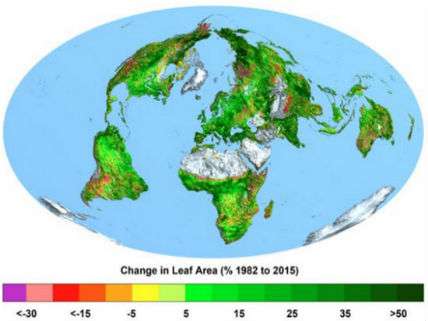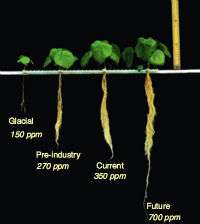Greener Earth Thanks to Extra Carbon Dioxide from Fossil Fuels, Says New Study
But benefits won't last forever as climate change gets worse

Earth is getting much greener because humanity is adding more carbon dioxide to the atmosphere by burning coal, oil, and natural gas. The amount of carbon dioxide in the atmosphere has increased from 280 parts per million (ppm) in 1800 to nearly 400 ppm today. Plants breathe in carbon dioxide and use it to make the sugars, starches, carbohydrates, and proteins that are used to their construct roots, stems, and leaves. Carbon dioxide is essentially a kind of fertilizer.
A new study in Nature Climate Change, "Greening of earth and its drivers," analyzes satellite data from 1982 to 2009 and finds that between 25 and 50 percent of the earth's terrestrial surface is becoming greener whereas only 4 percent is browner. They attribute 70 percent of the observed greening trend to the carbon dioxide fertilization effect, 9 percent to extra nitrogen added by human activities like farming, 8 percent to a warmer wetter climate, and 4 percent to land cover changes, e.g., abandonment of farms and reforestation.

An intriguing 2010 study in the journal New Phytologist looked at how low levels of carbon dioxide affect plant growth. Toward the end of the last ice age, atmospheric levels of carbon dioxide were around 180 to 200 ppm. The researchers estimate in such a carbon dioxide impoverished atmosphere that plant growth was about 50 percent lower than at present. Increasing levels of carbon dioxide not only raised global average temperatures but perhaps made a switch to agriculture worthwhile for our ancestors by raising plant productivity.
Despite the good news that extra carbon dioxide is greening the planet, the researchers believe that future increases will have less and less effect on plants; chiefly because growth will be limited by the lack of other nutrients. The BBC also reports, "The lead author, Prof Ranga Myneni from Boston University, told BBC News the extra tree growth would not compensate for global warming, rising sea levels, melting glaciers, ocean acidification, the loss of Arctic sea ice, and the prediction of more severe tropical storms."
No silver lining is evidently without its dark cloud.


Show Comments (58)